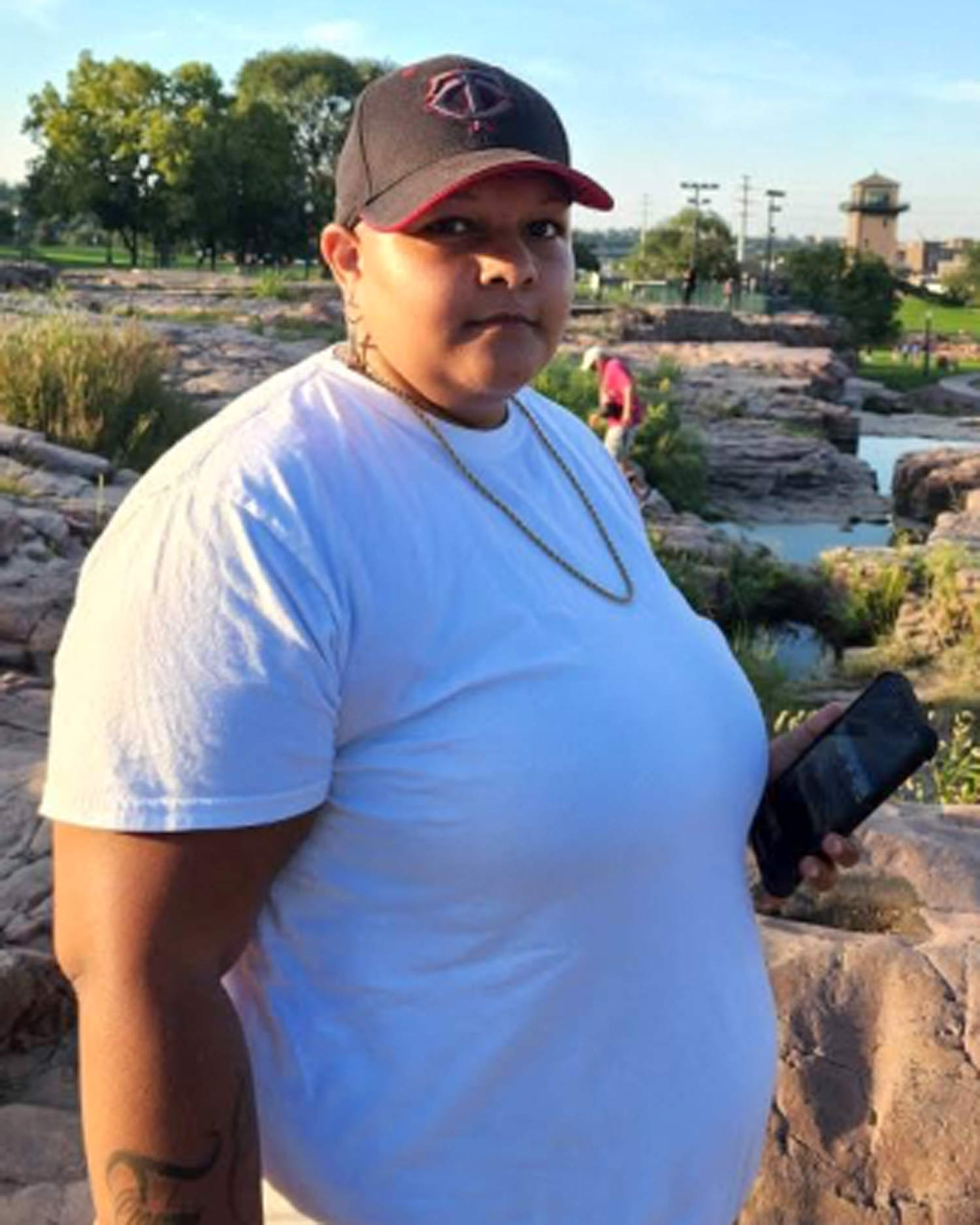The Dictatorship
New York investigators say they have no indication of a hate crime in Sam Nordquist’s killing

Authorities in New York have charged five people with murder in the death of Sam Nordquista 24-year-old transgender man from Minnesota whose body was found in New York’s Finger Lakes region last week. As the investigation continues, law enforcement officials said that they have found no signs that the killing was a hate crime.
The Ontario County district attorney and the New York State Police said in a joint statement Sunday that the suspects had known Nordquist and that they self-identified as part of the LBGTQ community. At least one of the suspects lived with Nordquist “in the time period leading up to the instant offense,” they said.
“We urge the community not to speculate on the motive behind the murder as we work to find justice for Sam,” the statement said, adding that investigators are still in the early stages. “At this time we have no indication that Sam’s murder was a hate crime.”
Under New York state lawa hate crime is defined in part as an offense “committed or intended to be committed in whole or in substantial part because of a belief or perception regarding the race, color, national origin, ancestry, gender, gender identity or expression, religion, religious practice, age, disability or sexual orientation of a person, regardless of whether the belief or perception is correct.” A hate crime charge is known to be hard to prosecutegiven the high burden of proof that a crime was carried out due to bias.
Nordquist’s Mother, Linda Nordquist,”https://www.kare11.com/article/news/crime/mom-minnesota-transgender-man-killed-nyc-speaks-sam-nordquist/89-459e4013-346e-4a28-af6d-43feeeb2d1bd” target=”_blank”> Told Kare 11a Minneapolis news station, that her son had traveled to New York in late September to meet an online girlfriend. He had plans to return to Minnesota two weeks later, and his mother requested a welfare check when he did not return. His family last heard from him in January, according to the missing persons report.
Nordquist’s remains were found Thursday in a field in Yates County, approximately 50 miles south of Rochester. At a news conference Saturday, New York State Police Capt. Kelly Swift said Nordquist had been subjected to “prolonged physical and psychological abuse at the hands of multiple individuals,” which resulted in his death.
Swift said it was “one of the most horrific crimes I have ever investigated” in her two decades in law enforcement.
The five suspects, who have all been charged with second-degree murder with depraved indifference, are Precious Arzuaga, 38; Jennifer A. Quijano, 30; Kyle Sage, 33; Patrick A. Goodwin, 30; and Emily Motyka, 19. NBC News reported that it wasn’t immediately clear whether any of them had legal representation.
Nordquist’s murder has led to an outpouring of grief and shock among the LGBTQ community. His mother told KARE 11 that he “had a heart of gold and wouldn’t hurt anybody.”
Data has long shown that trans people, especially trans people of color and Black trans womenface disproportionately high rates of fatal violence. According to the Human Rights Campaignat least 32 transgender and gender-nonconforming people were violently killed in 2024 in the U.S.
Clarissa-Jan Lim is a breaking/trending news blogger for BLN Digital. She was previously a senior reporter and editor at BuzzFeed News.
The Dictatorship
As energy costs rise, everyone wants data centers to pick up the tab

HARRISBURG, Pa. (AP) — As outrage spreads over energy-hungry data centerspoliticians from President Donald Trump to local lawmakers have found rare bipartisan agreement over insisting that tech companies — and not regular people — must foot the bill for the exorbitant amount of electricity required for artificial intelligence.
But that might be where the agreement ends.
The price of powering data centers has become deeply intertwined with concerns over the cost of living, a dominant issue in the upcoming midterm elections that will determine control of Congress and governors’ offices.
Some efforts to address the challenge may be coming too late, with energy costs on the rise. And even though tech giants are pledging to pay their “fair share,” there’s little consensus on what that means.
“‘Fair share’ is a pretty squishy term, and so it’s something that the industry likes to say because ‘fair’ can mean different things to different people,” said Ari Peskoe, who directs the Electricity Law Initiative at Harvard University.
It’s a shift from last year, when states worked to woo massive data center projects and Trump directed his administration to do everything it could to get them electricity. Now there’s a backlash as towns fight data center projects and some utilities’ electricity bills have risen quickly.
Anger over the issue has already had electoral consequenceswith Democrats ousting two Republicans from Georgia’s utility regulatory commission in November.
“Voters are already connecting the experience of these facilities with their electricity costs and they’re going to increasingly want to know how government is going to navigate that,” said Christopher Borick, a pollster and director of the Muhlenberg College Institute of Public Opinion.
Energy race stokes concerns
Data centers are sprouting across the U.S., as tech giants scramble to meet worldwide demand for chatbots and other generative AI products that require large amounts of computing power to train and operate.
The buildings look like giant warehouses, some dwarfing the footprints of factories and stadiums. Some need more power than a small city, more than any utility has ever supplied to a single user, setting off a race to build more power plants.
The demand for electricity can have a ripple effect that raises prices for everyone else. For example, if utilities build more power plants or transmission lines to serve them, the cost can be spread across all ratepayers.
Concerns have dovetailed with broader questions about the cost of living, as well as fears about the powerful influence of tech companies and the impact of artificial intelligence.
Trump continues to embrace artificial intelligence as a top economic and national security priority, although he seemed to acknowledge the backlash last month by posting on social media that data centers “must ‘pay their own way.’”
At other times, he has brushed concerns aside, declaring that tech giants are building their own power plants, and Energy Secretary Chris Wright contends that data centers don’t inflate electricity bills — disputing what consumer advocates and independent analysts say.
States moving to regulate
Some states and utilities have started to identify ways to get data centers to pay for their costs.
They’ve required tech companies to buy electricity in long-term contracts, pay for the power plants and transmission upgrades they need and make big down payments in case they go belly-up or decide later they don’t need as much electricity.
But it might be more complicated than that. Those rules can’t fix the short-term problem of ravenous demand for electricity that is outpacing the speed of power plant construction, analysts say.
“What do you do when Big Tech, because of the very profitable nature of these data centers, can simply outbid grandma for power in the short run?” Abe Silverman, a former utility regulatory lawyer and an energy researcher at Johns Hopkins University. “That is, I think, going to be the real challenge.”
Some consumer advocates say tech companies’ fair share should also include the rising cost of electricity, grid equipment or natural gas that’s driven by their demand.
In Oregon, which passed a law to protect smaller ratepayers from data centers’ power costs, a consumer advocacy group is jousting with the state’s largest utility, Portland General Electric, over its plan on how to do that.
Meanwhile, consumer advocates in various states — including Indiana, Georgia and Missouri — are warning that utilities could foist the cost of data center-driven buildouts onto regular ratepayers there.
Pushback from lawmakers, governors
Utilities have pledged to ensure electric rates are fair. But in some places it may be too late.
For instance, in the mid-Atlantic grid territory from New Jersey to Illinois, consumer advocates and analysts have pegged billions of dollars in rate increases hitting the bills of regular Americans on data center demand.
Legislation, meanwhile, is flooding into Congress and statehouses to regulate data centers.
Democrats’ bills in Congress await Republican cosponsors, while lawmakers in a number of states are floating moratoriums on new data centers, drafting rules for regulators to shield regular ratepayers and targeting data center tax breaks and utility profits.
Governors — including some who worked to recruit data centers to their states — are increasingly talking tough.
Arizona Gov. Katie Hobbs, a Democrat running for reelection this year, wants to impose a penny-a-gallon water fee on data centers and get rid of the sales tax exemption there that most states offer data centers. She called it a $38 million “corporate handout.”
“It’s time we make the booming data center industry work for the people of our state, rather than the other way around,” she said in her state-of-the-state address.
Blame for rising energy costs
Energy costs are projected to keep rising in 2026.
Republicans in Washington are pointing the finger at liberal state energy policies that favor renewable energy, suggesting they have driven up transmission costs and frayed supply by blocking fossil fuels.
“Americans are not paying higher prices because of data centers. There’s a perception there, and I get the perception, but it’s not actually true,” said Wright, Trump’s energy secretary, at a news conference earlier this month.
The struggle to assign blame was on display last week at a four-hour U.S. House subcommittee hearing with members of the Federal Energy Regulatory Commission.
Republicans encouraged FERC members to speed up natural gas pipeline construction while Democrats defended renewable energy and urged FERC to limit utility profits and protect residential ratepayers from data center costs.
FERC’s chair, Laura Swett, told Rep. Greg Landsman, D-Ohio, that she believes data center operators are willing to cover their costs and understand that it’s important to have community support.
“That’s not been our experience,” Landsman responded, saying projects in his district are getting tax breaks, sidestepping community opposition and costing people money. “Ultimately, I think we have to get to a place where they pay everything.”
___
Follow Marc Levy on X at: https://x.com/timelywriter
The Dictatorship
Trump’s EPA rejects climate change as health threat, but science strongly disagrees

The Trump administration on Thursday revoked a scientific finding that climate change is a danger to public health, an idea that President Donald Trump called “a scam.” But repeated scientific studies say it’s a documented and quantifiable harm.
Again and again, research has found increasing disease and deaths — thousands every year — in a warming world.
The Environmental Protection Agency finding in 2009, under the Obama administration, has been the legal underpinning of nearly all regulations fighting global warming.
“It boggles the mind that the administration is rescinding the endangerment finding; it’s akin to insisting that the world is flat or denying that gravity is a thing,” said Dr. Howard Frumkin, a physician and professor emeritus of public health at the University of Washington.
Thousands of scientific studies have looked at climate change and its effects on human health in the past five years and they predominantly show climate change is increasingly dangerous to people.
Many conclude that in the United States, thousands of people have died and even more were sickened because of climate change in the past few decades.
For example, a study on “Trends in heat-related deaths in the U.S., 1999-2023 ” in the prestigious JAMA journal shows the yearly heat-related death count and rate have more than doubled in the past quarter century from 1,069 in 1999 to a record high 2,325 in 2023.
A 2021 study in Nature Climate Change looked at 732 locations in 43 countries — including 210 in the United States — and determined that more than a third of heat deaths are due to human-caused climate change. That means more than 9,700 global deaths a year attributed to warming from the burning of coal, oil and natural gas.
A new study published this week found that 2.2% of summer deaths in Texas from 2010 to 2023 were heat related “as climate change brings more frequent and intense heat to Texas.”
Research is booming on the topic
The Shell Norco oil refinery operates in Norco, La., April 7, 2025. (AP Photo/Gerald Herbert, File)
The Shell Norco oil refinery operates in Norco, La., April 7, 2025. (AP Photo/Gerald Herbert, File)
In the more than 15 years, since the government first determined climate change to be a public health danger, there have been more than 29,000 peer-reviewed studies that looked at the intersection of climate and health, with more than 5,000 looking specifically at the United States, according to the National Library of Medicine’s PubMed research database.
More than 60% of those studies have been published in the past five years.
“Study after study documents that climate change endangers health, for one simple reason: It’s true,” said Frumkin, a former director of the National Center for Environmental Health appointed by President George W. Bush.
In a Thursday event at the White House, Trump disagreed, saying: “It has nothing to do with public health. This is all a scam, a giant scam.”
Experts strongly disagree.
“Health risks are increasing because human-cause climate change is already upon us. Take the 2021 heat dome for example, that killed (more than) 600 people in the Northwest,’’ said Dr. Jonathan Patz, a physician who directs the Center for Health, Energy and Environmental Research at the University of Wisconsin-Madison. “The new climate attribution studies show that event was made 150-fold more likely due to climate change.”
Patz and Frumkin both said the “vast majority” of peer-reviewed studies show health harms from climate change. Peer-reviewed studies are considered the gold standard of science because other experts pore over the data, evidence and methods, requiring changes, questioning techniques and conclusions.
More than just heat and deaths
FILE Joe Chyuwei, right, Addison Black, front center, James Black, front left, and back row from left, Helen Chyuwei, Jameson Black, Grace Chyuwei and Grayson Black watch the sunset in the heat at Zabriskie Point, Aug. 3, 2025, in Death Valley National Park, Calif. (AP Photo/John Locher, File)
FILE Joe Chyuwei, right, Addison Black, front center, James Black, front left, and back row from left, Helen Chyuwei, Jameson Black, Grace Chyuwei and Grayson Black watch the sunset in the heat at Zabriskie Point, Aug. 3, 2025, in Death Valley National Park, Calif. (AP Photo/John Locher, File)
The various studies look at different parts of health. Some looked at deaths that wouldn’t have happened without climate change. Others looked at illnesses and injuries that didn’t kill people. Because researchers used different time periods, calculation methods and specific aspects of health, the final numbers of their conclusions don’t completely match.
Studies also examined disparities among different peoples and locations. A growing field in the research are attribution studies that calculate what proportion of deaths or illness can be blamed on human-caused climate change by comparing real-world mortality and illness to what computer simulations show would happen in a world without a spike in greenhouse gases.
Last year an international team of researchers looked at past studies to try to come up with a yearly health cost of climate change.
While many studies just look at heat deaths, this team tried to bring in a variety of types of climate change deaths — heat waves, extreme weather disasters such as 2017’s Hurricane Harvey, wildfires, air pollution, diseases spread by mosquitos such as malaria — and found hundreds of thousands of climate change deaths globally.
They then used the EPA’s own statistic that puts a dollar value on human life — $11.5 million in 2014 dollars — and calculated a global annual cost “on the order of at least $10 billion.”
Studies also connect climate change to waterborne infections that cause diarrhea, mental health issues and even nutrition problemsFrumkin said.
“Public health is not only about prevention of diseases, death and disability but also well-being. We are increasingly seeing people displaced by rising seas, intensifying storms and fires,” said Dr. Lynn Goldman, a physician and dean emeritus at the George Washington University School of Public Health.
“We have only begun to understand the full consequences of a changing climate in terms of health.”
Cold also kills and that’s decreasing
The issue gets complicated when cold-related deaths are factored in. Those deaths are decreasing, yet in the United States there are still 13 times more deaths from cold exposure than heat exposure, studies show.
Another study concludes that until the world warms another 2.7 degrees (1.5 degrees Celsius) from now, the number of temperature-related deaths won’t change much “due to offsetting decreases in cold-related mortality and increases in heat-related deaths.”
But that study said that after temperatures rise beyond that threshold, and if society doesn’t adapt to the increased heat, “total mortality rises rapidly.”
___
The Associated Press’ climate and environmental coverage receives financial support from multiple private foundations. AP is solely responsible for all content. Find AP’s standards for working with philanthropies, a list of supporters and funded coverage areas at AP.org.
The Dictatorship
Things to know about EPA revoking ‘endangerment finding’

The Environmental Protection Agency on Thursday revoked its own 2009 “endangerment finding,” a scientific conclusion that for 16 years has been the central basis for regulating planet-warming emissions from power plants, vehicles and other sources.
The finding itself is straightforward: Carbon dioxide and other greenhouse gases — caused by burning fossil fuels such as coal, oil and gas — endanger public health and welfare.
It was adopted after the U.S. Supreme Court ruled in 2007 that greenhouse gases are air pollutants that can be regulated under the Clean Air Act.
The Trump administration says the finding hurts industry and the economy and that the Obama and Biden administrations twisted science to determine that greenhouse gases are a public health risk.
Environmentalists say those gases are a clear threat because climate change worsens weather disasters such as floods, heat waves and drought.
Here’s what to know:
How has the endangerment finding been used?
The Jeffrey Energy Center coal-fired power plant operates at sunset near Emmett, Kan., Jan. 3, 2026, in Topeka, Kan. (AP Photo/Charlie Riedel, File)
The Jeffrey Energy Center coal-fired power plant operates at sunset near Emmett, Kan., Jan. 3, 2026, in Topeka, Kan. (AP Photo/Charlie Riedel, File)
Since taking effect in 2010, during President Barack Obama’s first term, the endangerment finding has been the legal underpinning for new regulations targeting emissions from vehicles, oil and gas facilities and large industries, including power plants.
The EPA also determined that greenhouse gas emissions from some aircraft endanger health and welfare, setting the stage for future regulations.
Under President Donald Trump, the Department of Energy has suggested that climate models used by scientists to predict warming have overreached, that long-term trends for disasters generally don’t show much change and that climate has little impact on the economy.
Why does it matter?
Climate scientists warn that overturning the endangerment finding undermines decades of scientific progress and damages the credibility of U.S. institutions tasked with protecting the environment.
More importantly, scientists say rising global temperatures — the hottest years on record have all occurred since 2009 — cause more extreme weather that endangers people and causes billions of dollars in damage from more frequent and severe heat waves, wildfires, droughts and catastrophic flooding from more-intense storms.
The EPA action repeals all greenhouse gas emissions standards for cars and trucks, but experts say it could trigger a broader undoing of climate regulations for stationary sources such as power plants and oil and gas facilities. It also could prevent future administrations from proposing rules to address global warming because they would have to restart the scientific and legal process to establish a new endangerment finding, which could take years and face legal challenges, said David Doniger, a climate expert at the Natural Resources Defense Council.
What happens next?
President Donald Trump departs with Environmental Protection Agency director Lee Zeldin and Office of Management and Budget director Russell Vought, right after announcing the EPA will no longer regulate greenhouse gases, in the Roosevelt Room of the White House, Thursday, Feb. 12, 2026, in Washington. (AP Photo/Evan Vucci)
President Donald Trump departs with Environmental Protection Agency director Lee Zeldin and Office of Management and Budget director Russell Vought, right after announcing the EPA will no longer regulate greenhouse gases, in the Roosevelt Room of the White House, Thursday, Feb. 12, 2026, in Washington. (AP Photo/Evan Vucci)
Environmental groups are sure to challenge the revocation in court.
So far, federal courts have repeatedly rejected legal challenges to the finding, including a 2023 decision by the U.S. Court of Appeals for the District of Columbia Circuit.
___
The Associated Press’ climate and environmental coverage receives financial support from multiple private foundations. AP is solely responsible for all content. Find AP’s standards for working with philanthropies, a list of supporters and funded coverage areas at AP.org.
-

 The Dictatorship12 months ago
The Dictatorship12 months agoLuigi Mangione acknowledges public support in first official statement since arrest
-

 Politics12 months ago
Politics12 months agoFormer ‘Squad’ members launching ‘Bowman and Bush’ YouTube show
-

 The Dictatorship5 months ago
The Dictatorship5 months agoMike Johnson sums up the GOP’s arrogant position on military occupation with two words
-

 Politics12 months ago
Politics12 months agoBlue Light News’s Editorial Director Ryan Hutchins speaks at Blue Light News’s 2025 Governors Summit
-

 Politics12 months ago
Politics12 months agoFormer Kentucky AG Daniel Cameron launches Senate bid
-

 The Dictatorship12 months ago
The Dictatorship12 months agoPete Hegseth’s tenure at the Pentagon goes from bad to worse
-
Uncategorized1 year ago
Bob Good to step down as Freedom Caucus chair this week
-

 Politics10 months ago
Politics10 months agoDemocrat challenging Joni Ernst: I want to ‘tear down’ party, ‘build it back up’




